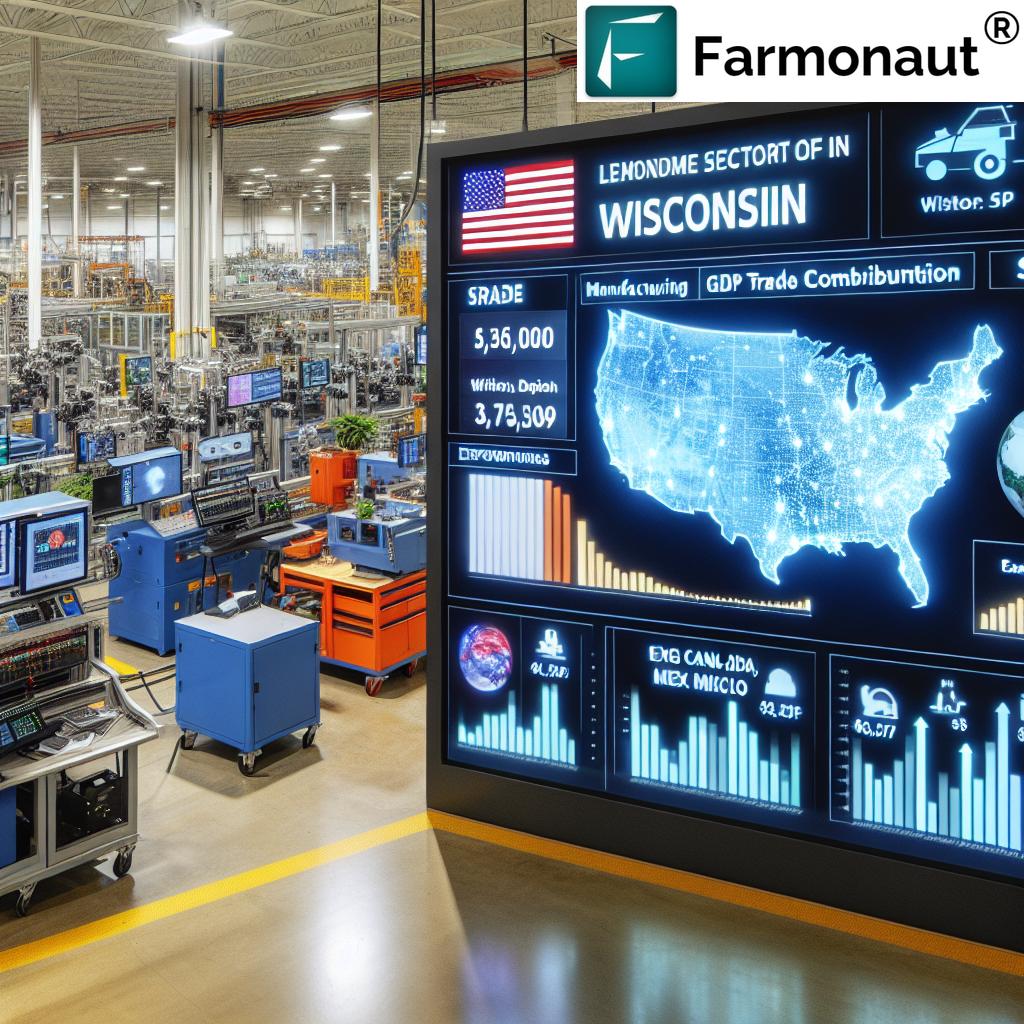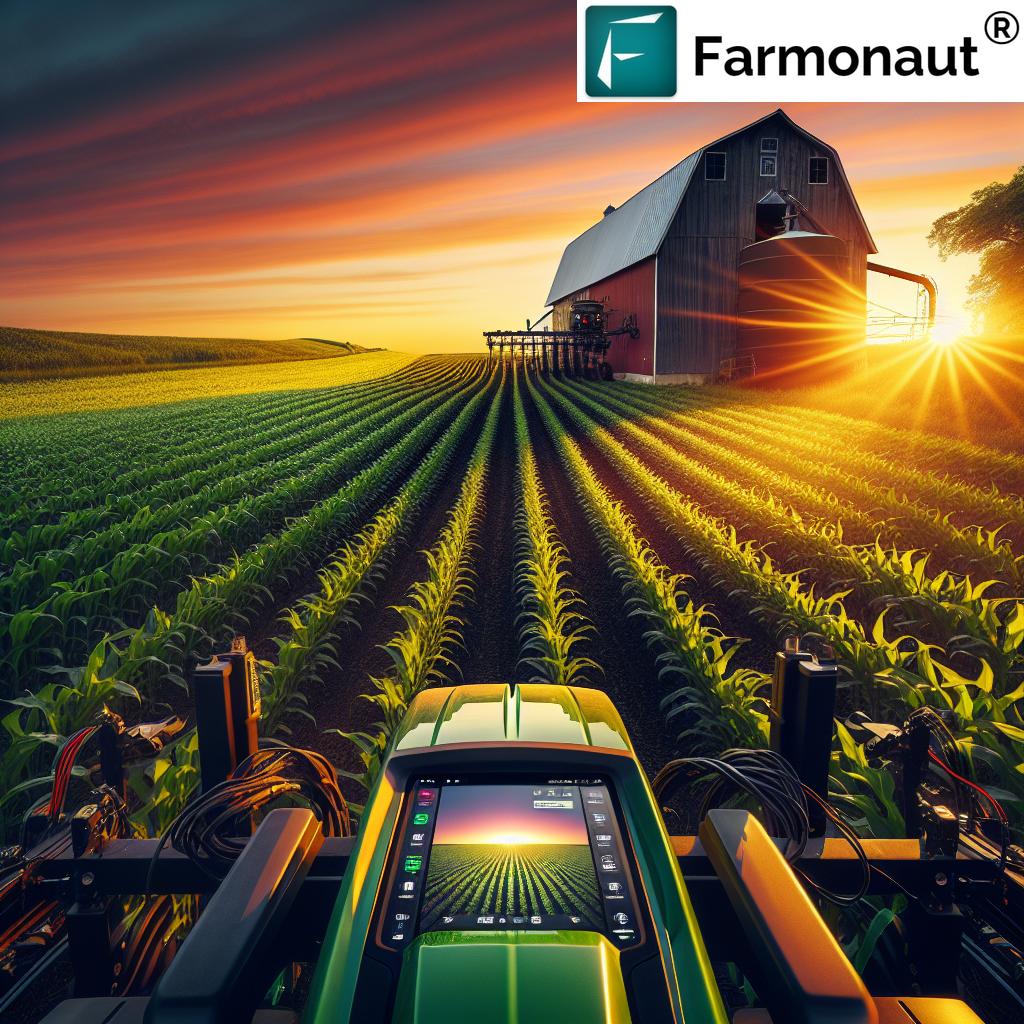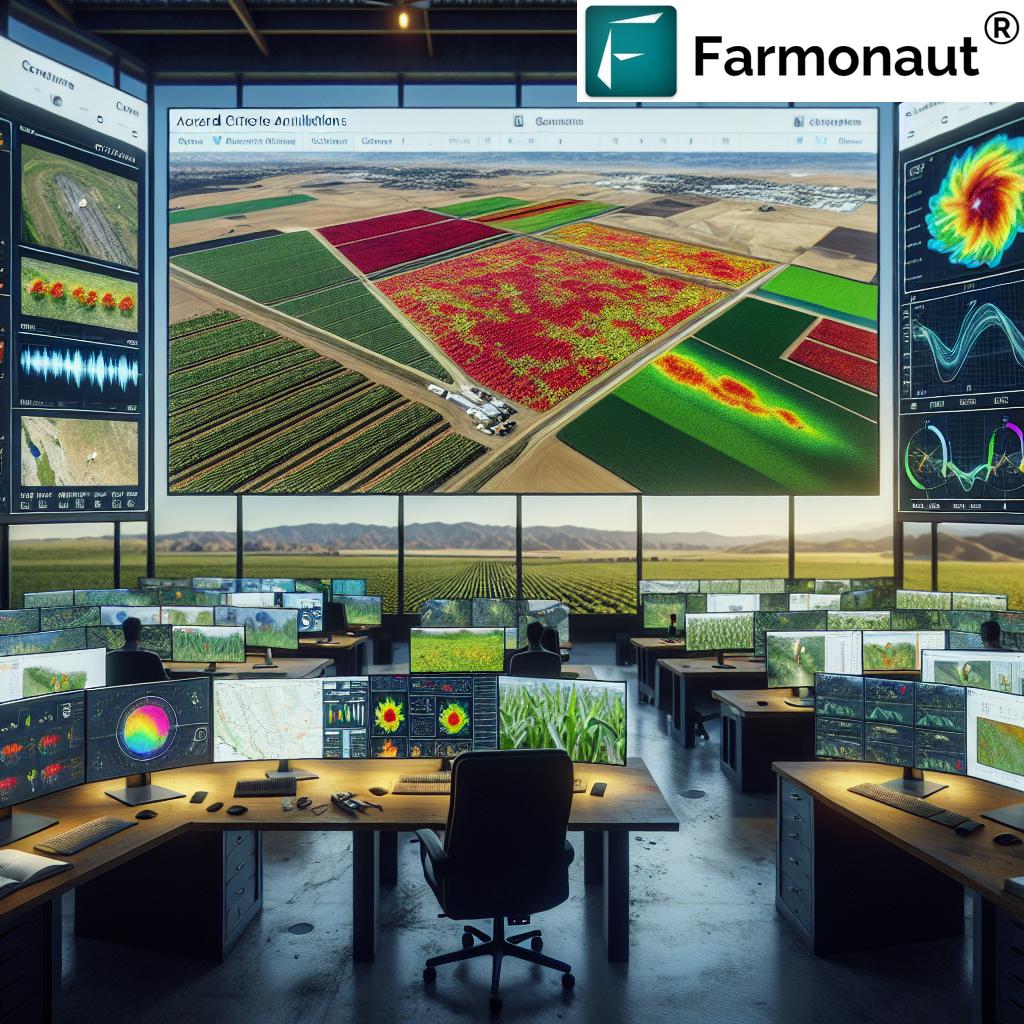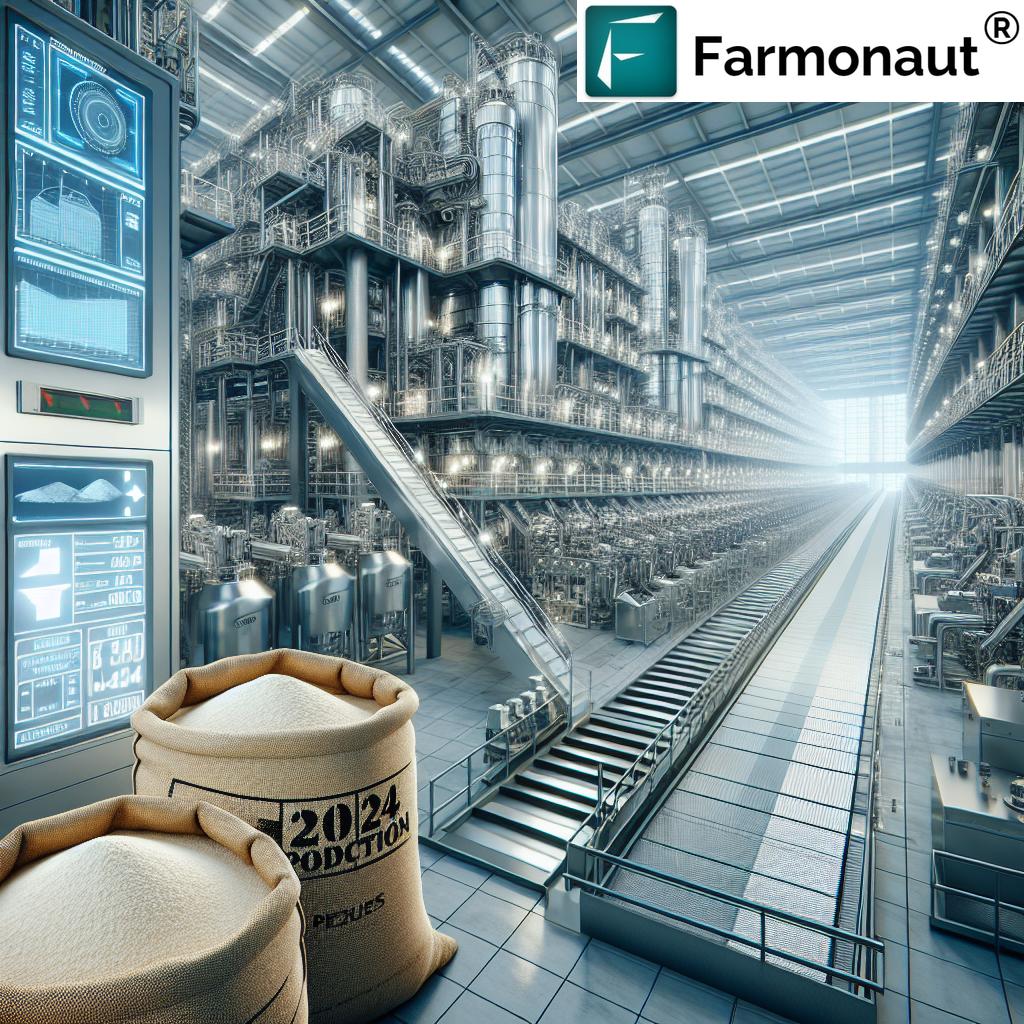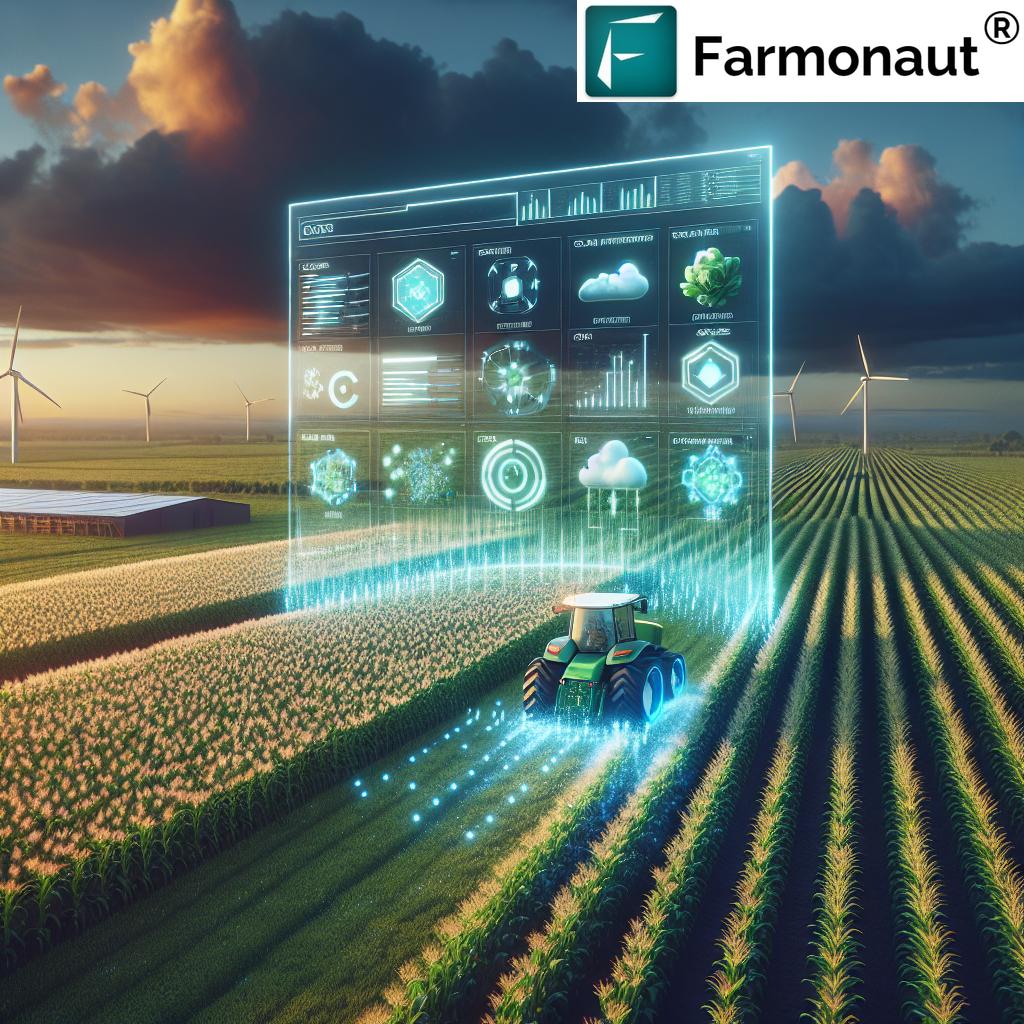Kentucky’s Agricultural Revolution: Boosting Economic Growth Through Smart Farming in 2024
“Kentucky’s agriculture sector projects $8.3 billion in cash receipts for 2024, highlighting farming’s economic importance.”
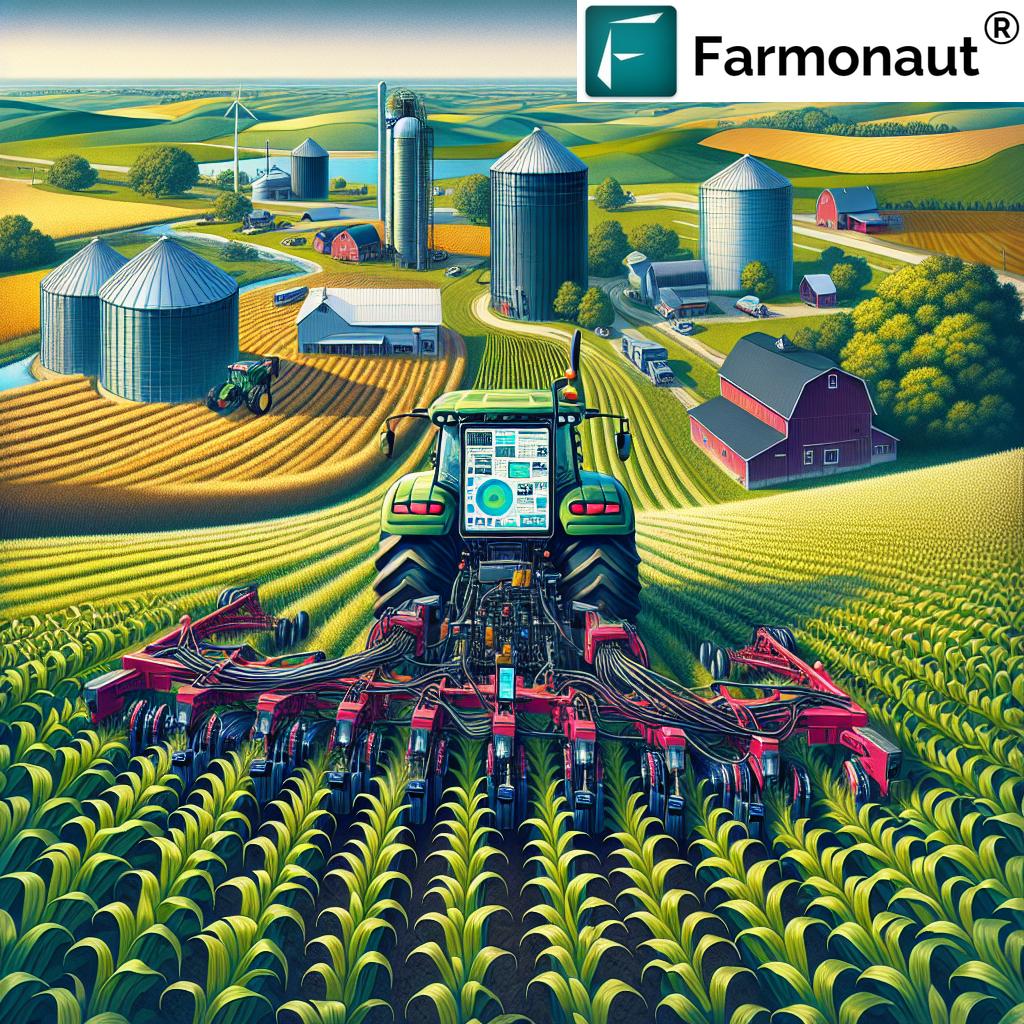
As we embark on a new era of agricultural innovation in Kentucky, we are witnessing a remarkable transformation that promises to reshape our state’s economic landscape. The year 2024 marks a pivotal moment in Kentucky’s agricultural history, as we embrace smart farming technologies and sustainable practices to drive unprecedented growth and prosperity. In this comprehensive analysis, we’ll explore how Kentucky’s farming sector is revolutionizing its approach to agriculture, leveraging cutting-edge solutions like those offered by Farmonaut to optimize crop yields, enhance market value, and contribute significantly to the state’s overall economic development.
The Economic Impact of Kentucky Agriculture in 2024
Kentucky’s agricultural sector has long been a cornerstone of our state’s economy, but the projections for 2024 underscore just how vital this industry has become. With anticipated cash receipts nearing $8.3 billion, we’re seeing a modest yet significant increase of 3.3% compared to the previous year. This growth is not just a number; it represents the hard work and innovation of countless farming families across our state.
However, the true impact of agriculture on Kentucky’s economy goes far beyond these cash receipts. When we consider the broader economic contribution, including related industries and services, the figure soars to an estimated $49.6 billion. This staggering amount highlights the integral role that agriculture plays in driving our state’s economic engine.
Smart Farming: The Catalyst for Growth
At the heart of this agricultural revolution is the adoption of smart farming solutions. Companies like Farmonaut are at the forefront, providing innovative technologies that are transforming how we approach farming in Kentucky. By leveraging precision agriculture technologies, farmers across the state are optimizing their operations in ways that were unimaginable just a few years ago.
- Satellite-Based Crop Health Monitoring: Real-time insights into vegetation health and soil moisture levels
- AI-Driven Advisory Systems: Personalized recommendations for crop management
- Blockchain-Based Traceability: Enhancing transparency and trust in agricultural supply chains
- Resource Management Tools: Optimizing the use of water, fertilizers, and other critical resources
These advanced tools are not just improving efficiency; they’re fundamentally changing the way we think about farming. By providing farmers with data-driven insights, we’re enabling them to make more informed decisions that boost productivity while promoting sustainability.
Enhancing Market Value for Kentucky Farmers
One of the key focuses of Kentucky’s agricultural strategy in 2024 is enhancing market value for our farmers. This isn’t just about increasing prices; it’s about creating a more resilient and profitable agricultural sector that can withstand economic fluctuations and environmental challenges.
Through the implementation of smart farming solutions, we’re seeing Kentucky farmers:
- Improve crop quality and yield consistency
- Reduce waste and operational costs
- Access new markets through improved traceability and sustainability practices
- Diversify their crop portfolios based on data-driven insights
These improvements translate directly into higher market values for Kentucky’s agricultural products, positioning our state as a leader in quality and innovation within the national and global markets.
Building a Robust Agricultural Infrastructure
The success of Kentucky’s agricultural revolution hinges on the development of a robust infrastructure that can support smart farming practices. This includes:
- Digital Connectivity: Expanding high-speed internet access to rural areas
- Data Centers: Establishing facilities to process and analyze agricultural data
- Educational Programs: Training farmers and agricultural workers in new technologies
- Research and Development: Investing in agricultural innovation centers
By focusing on these critical areas, we’re laying the groundwork for long-term success in Kentucky’s agricultural sector. This infrastructure not only supports current farming practices but also positions our state to adapt quickly to future innovations in agritech.
Farmonaut: Empowering Kentucky’s Farmers
At the center of this technological revolution is Farmonaut, a company that’s making precision agriculture accessible and affordable for farmers across Kentucky. Through its suite of advanced tools, Farmonaut is empowering our farming communities to:
- Monitor crop health in real-time using satellite imagery
- Receive AI-powered advice on crop management strategies
- Implement sustainable farming practices based on data-driven insights
- Optimize resource usage, reducing costs and environmental impact
For Kentucky farmers looking to leverage these cutting-edge solutions, Farmonaut offers easy access through various platforms:
“Kentucky’s farming industry contributes an estimated $49.6 billion to the state’s overall economy, showcasing its significant impact.”
Rural Economic Growth Strategies
The agricultural revolution in Kentucky is not just about improving farm productivity; it’s a cornerstone of our broader rural economic growth strategy. By embracing smart farming technologies and sustainable practices, we’re creating new opportunities for rural communities across the state. This includes:
- Job creation in agritech and related industries
- Increased income for farming families
- Development of new skills and expertise in rural areas
- Attraction of young people to agriculture through modernization
These strategies are vital for ensuring the long-term viability and prosperity of Kentucky’s rural communities, helping to bridge the urban-rural divide and create a more balanced state economy.
Sustainable Farming Practices: A Key to Future Success
As we look to the future of Kentucky agriculture, sustainability is at the forefront of our efforts. Smart farming technologies are playing a crucial role in helping our farmers adopt more sustainable practices, including:
- Precision application of water and fertilizers
- Reduced use of pesticides through targeted interventions
- Improved soil health management
- Carbon footprint reduction strategies
These sustainable practices not only benefit the environment but also contribute to the long-term economic viability of our farms. By reducing input costs and improving resource efficiency, Kentucky farmers are positioning themselves for success in an increasingly competitive global market.

The Role of Agricultural Data Analytics
In the era of smart farming, data is king. Agricultural data analytics are providing Kentucky farmers with unprecedented insights into their operations, enabling them to:
- Predict optimal planting and harvesting times
- Identify potential pest and disease outbreaks before they spread
- Optimize crop rotations for soil health and yield maximization
- Make informed decisions on crop selection based on market trends and environmental conditions
Farmonaut’s platform is at the forefront of this data revolution, offering powerful analytics tools that turn raw data into actionable insights. For developers and businesses looking to integrate these capabilities into their own systems, Farmonaut provides API access, which you can explore at Farmonaut’s API. For detailed documentation, visit the API Developer Docs.
Crop Yield Optimization Techniques
Maximizing crop yields is a primary goal for Kentucky farmers, and smart farming technologies are providing new and innovative ways to achieve this. Some of the key techniques being employed include:
- Variable rate technology for precise input application
- Crop stress detection and early intervention
- Microclimate monitoring for optimal growing conditions
- Genetic selection and breeding informed by big data
These techniques, supported by Farmonaut’s advanced satellite monitoring and AI-driven insights, are helping Kentucky farmers push the boundaries of what’s possible in terms of crop yield and quality.
The Impact on Kentucky’s Economy: A Comparative Analysis
To better understand the transformative impact of smart farming on Kentucky’s agricultural sector, let’s take a look at a comparative analysis of key economic indicators between 2023 and 2024:
| Year | Cash Receipts ($ billions) | Overall Economic Contribution ($ billions) | Farms Adopting Smart Farming Technologies | Average Yield Increase (%) |
|---|---|---|---|---|
| 2023 | 8.0 | 48.0 | 15,000 | 5% |
| 2024 (Projected) | 8.3 | 49.6 | 18,500 | 7% |
This table clearly illustrates the positive trajectory of Kentucky’s agricultural sector, with notable increases across all key indicators. The projected growth in farms adopting smart farming technologies is particularly encouraging, as it suggests a widespread embrace of innovative practices that are driving both productivity and sustainability.
Challenges and Opportunities
While the future of Kentucky agriculture looks bright, it’s important to acknowledge the challenges that come with this rapid transformation:
- Initial costs of implementing new technologies
- Need for ongoing education and training
- Data privacy and security concerns
- Ensuring equitable access to smart farming solutions for all farm sizes
However, these challenges also present opportunities for innovation and growth. By addressing these issues head-on, Kentucky can position itself as a leader in sustainable and technologically advanced agriculture.
The Future of Kentucky Agriculture
As we look to the future, the trajectory for Kentucky’s agricultural sector is undeniably positive. The integration of smart farming technologies, coupled with a focus on sustainability and economic development, is setting the stage for a new era of prosperity in our rural communities.
Key areas of focus for the future include:
- Continued investment in agricultural research and development
- Expansion of educational programs to support the next generation of tech-savvy farmers
- Development of new markets for Kentucky’s agricultural products, both domestically and internationally
- Further integration of renewable energy solutions in farming operations
By staying at the forefront of agricultural innovation and embracing the opportunities presented by companies like Farmonaut, Kentucky is well-positioned to become a model for modern, sustainable, and economically vibrant agriculture.
Conclusion: A Bright Future for Kentucky Agriculture
As we’ve explored throughout this analysis, Kentucky’s agricultural sector is on the cusp of a transformative era. The integration of smart farming technologies, exemplified by solutions like those offered by Farmonaut, is driving unprecedented growth and innovation in our farming communities. With projected cash receipts of $8.3 billion and an overall economic contribution of $49.6 billion in 2024, agriculture remains a cornerstone of Kentucky’s economy.
The adoption of precision agriculture technologies, sustainable farming practices, and data-driven decision-making is not just improving crop yields and market values; it’s reshaping the very nature of farming in our state. As we continue to invest in agricultural infrastructure, education, and innovation, we’re laying the groundwork for a prosperous and sustainable future for Kentucky’s farming families and rural communities.
The agricultural revolution in Kentucky is more than just a technological upgrade; it’s a comprehensive reimagining of how we approach farming, rural development, and economic growth. By embracing these changes and continuing to innovate, Kentucky is poised to become a leader in modern agriculture, setting an example for states across the nation and contributing significantly to global food security and sustainability efforts.
As we move forward, the collaboration between farmers, technology providers like Farmonaut, government agencies, and educational institutions will be crucial in realizing the full potential of this agricultural renaissance. Together, we’re cultivating not just crops, but a brighter, more prosperous future for all Kentuckians.
FAQ Section
Q: What is smart farming, and how is it benefiting Kentucky agriculture?
A: Smart farming refers to the use of modern technologies like satellite imaging, AI, and data analytics in agriculture. In Kentucky, it’s helping farmers optimize crop yields, reduce resource usage, and make more informed decisions, ultimately boosting productivity and profitability.
Q: How significant is agriculture to Kentucky’s economy?
A: Agriculture is a cornerstone of Kentucky’s economy, with projected cash receipts of $8.3 billion and an overall economic contribution of $49.6 billion in 2024, highlighting its crucial role in the state’s economic landscape.
Q: What role does Farmonaut play in Kentucky’s agricultural revolution?
A: Farmonaut provides advanced satellite-based farm management solutions, offering tools for crop health monitoring, AI-driven advisory services, and resource management. These technologies are helping Kentucky farmers adopt precision agriculture practices, improving their efficiency and sustainability.
Q: How is Kentucky addressing the challenges of implementing smart farming technologies?
A: Kentucky is focusing on expanding digital infrastructure in rural areas, investing in educational programs to train farmers in new technologies, and supporting research and development in agricultural innovation to address implementation challenges.
Q: What are some of the sustainable farming practices being adopted in Kentucky?
A: Kentucky farmers are adopting practices such as precision application of water and fertilizers, reduced pesticide use through targeted interventions, improved soil health management, and carbon footprint reduction strategies, all supported by smart farming technologies.







